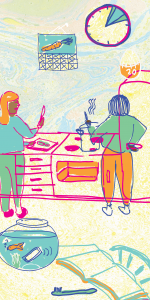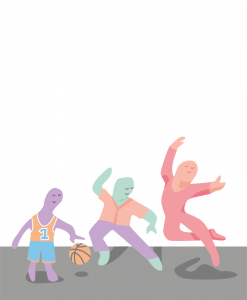Study like a pro
The task ahead can feel overwhelming. Breaking it down into bite size chunks can help managing study stress. Here are some tips from a fellow Chalmerist Björn Liljeqvist (E03), from his book "Plugga smart och lär dig mer".
- Eliminate distractions. Turn off notifications on phones and computers and put the phone away, out of sight. If you struggle with distractions, there are apps and settings on your phone that can help block notifications during certains time slots.
- Routine is key. Don't wait to get motivated. Instead, make studying a routine, like brushing your teeth. You don't need to consider whether you feel like it or not, just get started.
- Speaking of getting started. Set a timer to 20 min and focus on one task only. Take a short break and go for another 20 min.
- Log and reward. Even if 20 minutes can feel insignificant, it does count. Imagine a streak of 20 minutes blocks. You will soon be reluctant to break that streak.
- Before class - briefly familiarize yourself with the topic ahead. This will give you a head start and keep your mind focused. During class - Pay attention by asking questions in your head, taking notes or thinking about how everything fits together. After class - set aside a short time each day to test yourself on what you have learned.
- Don't cram. Learning is a process and your brain needs to recover between sessions.
- Stay connected. Let others help encourage and inspire your studies. Successful peers are often extremely willing to help others succeed.

Illustration: Mikael Oskarsson

Illustration: Mikael Oskarsson
Coping with stress and learning to relax
Stress is a natural survival mechanism for human beings. Otherwise we would not find food or escape danger. However stress can severely stop you from doing what you want and need to do. Learning to recognize the signs and knowing what to do when they arise, can help you not having stress take control of your studies or personal life, but work in your favour instead. Here are some tips, these and much more are found in our stress guide.
- Become aware and accept. Everyone feels stress. It's OK and it's perfectly normal.
- Recognise the signs. These can be very individual, but some common signs are tense muscles resulting in headaches and digestive disturbances. It can also be behavioural or emotional. Find the most common signs on page 6 in Stress guide.
- Understand that you can take control. There are techniques and tips on how you can manage stress when it arises. Find our 7+ tips in the Stress guide.
- Ask for help. Sometimes you just can't manage it by yourself. It's OK and there is always help to get. Learn more on page 16 in the Stress guide.
3 questions to the student welfare officer
Where can I get help if I am unable to handle stress?
For study related stress, we have student healthcare through Feelgood. You have the right to five visits per year and then furhter assistance through regular healthcare if needed.
- If you are unsure of whether your situation is study related or not, Feelgood or your study counsellor can help you figure this out. Study counsellors are professionals and all visits are confidential. In general, you can always turn to them for support or counsel. If you, for any reason, are not comfortable with contacting your own counsellor, you can always turn to a different one.
- You can talk to our chaplain Lars van der Heeg. Your issue does not have to be related to any religion, it can be of anything related to life, relationships, grief or life choices.
- If you feel that you don't know who to turn to, you can always consult me or your local SAMO. Just send an email and we will try to point you in the right direction.
- If you feel unsafe or have experienced something that made you uncomfortable, you can alys visit Safe at Chalmers.
- Find everyone on our List of contacts
How does the union work with study stress?
Each year we collect our students opinions on mental health and stress. This is our foundation for improving certain areas and we do this closely with the university. We also provide our own initiatives such as customised brochures and events. Ensuring that sports and recreation is a big part of the union also is a part of this work.
Your own best study tip?
For me personally studying together is key. It can feel odd after such long period of isolation due to the pandemic, but it's worth the effort. I find more motivation and inspiration from others. Especially important for those entirely new to Chalmers. Courses may feel like mountains to climb, but sharing this with eachother will not only help you get through the challenge, but also have fun. Furthermore, failing an exam is not the end of the world. Most of us don't get through our education without re-exams 😉
Remember - there is always SOMEONE to help you, even if it feels impossible or hopeless.
/Lovisa Eriksson, student welfare officer of 2021/2022

Foto: CFFC
